Saturday, December 20, 2008
Saturday In the Advent Embertime
This is the last Ember Day until the beginning of Lent. That is something to think about.
We here in Boston are digging out from a substantial (6 or so inch) snowstorm. It may not be so easy to get to Mass or confession today, but try, as things will get very hectic with secular Christmas preparations, and this is a last chance, really, to reflect on our sins, and seek reconciliation with the Lord.
We here in Boston are digging out from a substantial (6 or so inch) snowstorm. It may not be so easy to get to Mass or confession today, but try, as things will get very hectic with secular Christmas preparations, and this is a last chance, really, to reflect on our sins, and seek reconciliation with the Lord.
Labels: Advent
Our Blessed Lady's Saturday
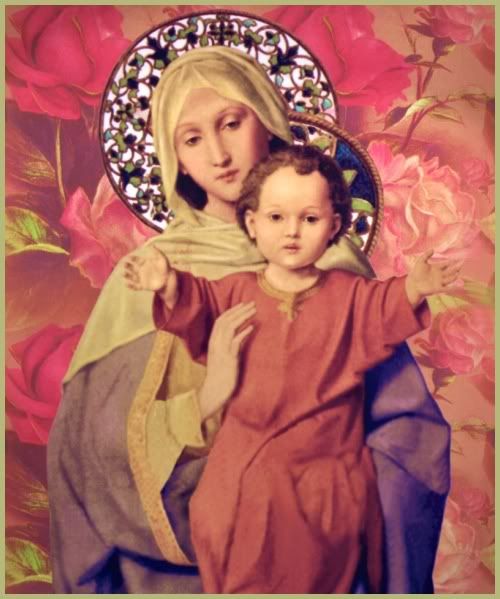
The Journey to Bethlehem
From THE MYSTICAL CITY OF GOD, Ven. Mary Agreda
TAN Books and Publishers, via Catholic Tradition
It had been decreed by the immutable will of Providence that the Only-begotten of the Father should be born in the town of Bethlehem (Mich. 5, 2), and accordingly it had been foretold by the Saints and Prophets of foregone ages (Jerem. 10, 9); for the decrees of the absolute will of God are infallible, and since nothing can resist them (Esther 13, 9), sooner would heaven and earth pass away than that they fail of accomplishment (Matt. 24, 35). The fulfillment of this immutable decree the Lord secured by means of an edict of Cæsar Augustus for the whole Roman empire, ordering the registration or enumeration of all the world, as Saint Luke says (2, 1). The Roman empire at that time embraced the greater part of what was then known of the earth and therefore they called themselves masters of the world, ignoring all the other nations. The object of this census was to make all the inhabitants acknowledge themselves as vassals of the emperor, and to pay a certain tax to their temporal lord; for this registration everyone was to go to his native city in order to be inscribed. This edict was also proclaimed in Nazareth and came to the hearing of Saint Joseph while he was on some errand. He returned to his house in sorrowful consternation and informed his heavenly Spouse of the news which had spread about concerning the edict. The most prudent Virgin answered: "Let not this edict of our temporal ruler cause thee any concern, my master and spouse, for all that happens to us is ordained by the Lord and King of Heaven and earth; and in all events His Providence will assist and direct us (Eccli. 22, 28). Let us resign ourselves into His hands and we shall not be disappointed."
Most holy Mary was capable of being entrusted with all the mysteries of her most holy Son and She knew of the prophecies and their fulfillment; hence, also, that the Only-begotten of the Father and her own was to be born in Bethlehem, a Stranger and an Unknown. But She said nothing of this to Saint Joseph; for without being commissioned by the Lord She would reveal none of His secrets. All that She was not commanded to reveal She concealed with admirable prudence, notwithstanding her desire of consoling her most faithful and holy spouse. She wished to entrust Herself to his direction and arrangement without acting the part of those who are wise in their own conceit, as Wisdom warns us (Prov. 3, 7). They therefore conferred with each other about the course to be pursued; for already the pregnancy of the heavenly Lady was far advanced and her parturition was approaching. Saint Joseph said: "Queen of heaven and earth and my Mistress, if Thou hast no order to the contrary from the Almighty, it seems to me necessary that I go alone. Yet, although this order refers only to the heads of families, I dare not leave Thee without assistance, nor could I live without Thee, nor would I have a moment's peace away from Thee; for my heart could not come to any rest without seeing Thee.
They at the same time resolved upon the day of their departure, and Joseph diligently searched in the town of Nazareth for some beast of burden to bear the Mistress of the world. He could not easily find one because so many people were going to different towns in order to fulfill the requirements of the edict of the emperor. But after much anxious inquiry Saint Joseph found an unpretentious little beast which, if we can call such creatures fortunate, was the most fortunate of all the irrational animals; since it was privileged not only to bear the Queen of all creation and the blessed fruit of her womb, the King of kings and the Lord of lords, but afterwards to be present at His Birth (Isaias 1, 3); and since it gave to its Creator the homage denied to Him by men. They provided the articles for the journey, which would last five days. The outfit of the heavenly travelers was the same as that which they had provided for their previous journey to the house of Zacharias on their visit to Elisabeth. They carried with them bread, fruit and some fishes, which ordinarily composed their nourishment. As the most prudent Virgin was enlightened regarding their protracted absence, She made use of prudent concealment in taking along the linens and clothes necessary for her heavenly delivery, for She wished to dispose all things: according to the exalted intents of the Lord and in preparation for the events which She expected. Their house they left in charge of some neighbor until they should return.
The most pure Mary and the glorious Saint Joseph departed from Nazareth for Bethlehem alone, poor and humble in the eyes of the world. None of the mortals thought more of them than what was warranted by their poverty and humility. But O the wonderful sacraments of the Most High, hidden to the proud, and unpenetrated by the wisdom of the flesh! They did not walk alone, poor or despised, but prosperous, rich and in magnificence. They were most worthy of the immense love of the eternal Father and most estimable in His eyes. They carried with them the Treasure of Heaven, the Deity itself. The whole court of the celestial ministers venerated them. All the inanimate beings recognized the living and true Ark of the Testament (Josue 3, 16) more readily than the waters of the Jordan recognized its type and shadow, when they courteously laid open and free the path for its passage and for those that followed it. They were accompanied by the ten thousand Angels, which were appointed by God Himself as the servants of her Majesty during that whole journey. These heavenly squadrons marched along as their retinue in human forms visible to the heavenly Lady, more refulgent than so many suns. She herself walked in their midst better guarded and defended than the bed of Solomon, surrounded by the sixty valiant ones of Israel, girded with their swords (Cant. 3, 7). Besides these ten thousand Angels there were many others, who descended from Heaven as messengers of the eternal Father to His Only-begotten made man in His most holy Mother, and who ascended from earth as their ambassadors with messages and treaties from them to the heavenly Father.
With these wonderful favors and delights, however, the Lord joined some hardships and inconveniences, which the Divine Mother encountered on the way. For the concourse of people in the taverns, occasioned by the imperial edict, was very disagreeable and annoying to the modest and retiring Virgin-Mother and her spouse. On account of their poverty and timid retirement they were treated with less hospitality and consideration than others, especially the well-to-do; for the world judges and usually confers its favors according to outward appearance and according to personal influence. Our holy pilgrims were obliged repeatedly to listen to sharp reprimands in the taverns, at which they arrived tired out by their journey, and in some of them they were refused admittance as worthless and despicable people. Several times they assigned to the Mistress of Heaven and earth some corner of the hallway; while at others She did not fare even so well, being obliged to retire with her husband to places still more humble and unbecoming in the estimation of the world. But in whatever places She tarried, how contemptible soever it might be considered, the courtiers of Heaven established their court around their supreme King and sovereign Queen. Immediately they surrounded and enclosed them like an impenetrable wall, securing the bridal chamber of Solomon against the terrors of the night. Her most faithful spouse Joseph, seeing the Mistress of Heaven so well guarded by the Angelic hosts, betook himself to rest and sleep; for to this She urged him on account of the hardships of travel. She, however, continued her celestial colloquies with the ten thousand Angels of her retinue.
Thus variously and wonderfully assisted, our travelers arrived at the town of Bethlehem at four o'clock of the fifth day, a Saturday. As it was at the time of the winter solstice, the sun was already sinking and the night was falling. They entered the town, and wandered through many streets in search of a lodging-house or inn for staying over night. They knocked at the doors of their acquaintances and nearer family relations; but they were admitted nowhere and in many places they met with harsh words and insults. The most modest Queen followed her spouse through the crowds of people, while he went from house to house and from door to door. Although She knew that the hearts and the houses of men were to be closed to them, and although to expose her state at her age to the public gaze was more painful to her modesty than to their failure to procure a night-lodging . . . While wandering through the streets they passed the office of the public registry and they inscribed their names and paid the fiscal tribute in order to comply with the edict and not be obliged to return. They continued their search, betaking themselves to other houses. But having already applied at more than fifty different places, they found themselves rejected and sent away from them all. The heavenly Spirits were filled with astonishment at these exalted mysteries of the Most High, which manifested the patience and meekness of His Virgin Mother and the unfeeling hardness of men. At the same time they blessed the Almighty in His works and hidden sacraments, since from that day on He began to exalt and honor poverty and humility among men.
It was nine o'clock at night when the most faithful Joseph, full of bitter and heartrending sorrow, returned to his most prudent Spouse and said: "My sweetest Lady, my heart is broken with sorrow at the thought of not only not being able to shelter Thee as Thou deservest and as I desire, but in not being able to offer Thee even any kind of protection from the weather, or a place of rest, a thing rarely or never denied to the most poor and despised in the world. No doubt Heaven, in thus allowing the hearts of men to be so unmoved as to refuse us a night-lodging conceals some mystery. I now remember, Lady, that outside the city walls there is a cave, which serves as a shelter for shepherds and their flocks. Let us seek it out; perhaps it is unoccupied, and we may there expect some assistance from Heaven, since we receive none from men on earth." The most prudent Virgin answered:
"My spouse and my master, let not thy kindest heart be afflicted because the ardent wishes which the love of thy Lord excites in thee cannot be fulfilled. Since I bear Him in my womb, let us, I beseech thee, give thanks for having disposed events in this way. The place of which thou speakest shall be most satisfactory to me. Let thy tears of sorrow be turned into tears of joy, and let us lovingly embrace poverty, which is the inestimable and precious treasure of my most holy Son. He came from Heaven in order to seek it, let us then afford Him an occasion to practice it in the joy of our souls; certainly I cannot be better delighted than to see thee procure it for me. Let us go gladly wherever the Lord shall guide us."
The holy Angels accompanied the heavenly pair, brilliantly lighting up the way, and when they arrived at the city gate they saw that the cave was forsaken and unoccupied. Full of heavenly consolation, they thanked the Lord for this favor . . .
WORDS OF THE QUEEN
My dearest daughter, if thou art of a meek and docile heart, these mysteries which thou hast written about and hast understood, will stir within thee sweet sentiments of love and affection toward the Author of such great wonders. I wish that, bearing them in mind, thou from this day on embrace with new and great esteem the contempt and neglect of the world. And tell me, dearest, if, in exchange for this forgetfulness and scorn of the world, God look upon thee with eyes of sweetest love, why shouldst thou not buy so cheaply what is worth an infinite price? What can the world give thee, even when it esteems thee and exalts thee most? And what dost thou lose, if thou despise it? Is its favor not all vanity and deceit (Ps. 4, 3)? Is it not all a fleeting and momentary shadow, which eludes the grasp of those that haste after it? Hence, if thou hadst all worldly advantage in thy possession, what great feat would it be to despise it as of no value? Consider how little thou dost in rejecting all of it for the love of God, for mine and that of the holy Angels. And if the world does not neglect thee as much as thou shouldst desire, do thou on thy own behalf despise it, in order to remain free and unhampered to enjoy to the full extent the highest Good with the plenitude of His most delightful love and intercourse.
My most holy Son is such a faithful Lover of souls that He hast set me as the teacher and living example of the love of humility and true contempt of worldly vanity and pride. He ordained also for His Own glory as well as for my sake that I, His Servant and Mother, should be left without shelter and be turned away by mortals, in order that afterwards His beloved souls might be so much the more readily induced to offer Him a welcome, thus obliging Him, by an artifice of love, to come and remain with them. He also sought destitution and poverty, not because He had any need of them for bringing the practice of virtues to the highest perfection, but in order to teach mortals the shortest and surest way for reaching the heights of Divine love and union with God.
Thou knowest well, my dearest, that thou hast been incessantly instructed and exhorted by Divine enlightenment to forget the terrestrial and visible and to gird thyself with fortitude (Prov. 31, 17), to raise thyself to the imitation of me, copying in thyself, according to thy capacity, the works and virtues manifested to thee in my life. This is the very first purpose of the knowledge which thou receivest in writing this history; for thou hast in me a perfect model, and by it thou canst arrange the converse and conduct of thy life in the same manner as I arranged mine in imitation of my sweetest Son. The dread with which this command to imitate me has inspired thee as a being above thy strength, thou must moderate and thou must encourage thyself by the words of my most holy Son in the Gospel of Saint Matthew: "Be ye perfect as My heavenly Father is perfect" (5, 8). This command of the Most High imposed upon His holy Church is not impossible of fulfillment, and, if His faithful children on their part dispose themselves properly, He will deny to none of them the grace of attaining His resemblance to the heavenly Father. All this my most holy Son has merited for them. But the degrading forgetfulness and neglect of men hinder them from maturing within themselves the fruits of His Redemption.
Of thee particularly I expect this perfection, and I invite thee to it by the sweet law of love which accompanies my instruction. Ponder and scrutinize, by the Divine light, the obligation under which I place thee, and labor to correspond with it like a faithful and anxious child. Let no difficulty or hardship disturb thee, nor deter thee from any virtuous exercise, no matter how hard it may be. Nor be content with striving after the love of God and salvation of thyself alone; if thou wouldst be perfect in imitating me and fulfilling all that the Gospel teaches, thou must work for the salvation of other souls and the exaltation of the holy name of my Son, making thyself an instrument in His powerful hands for the accomplishment of mighty works to advance His pleasure and glory.
Labels: Our Blessed Lady
O Clavis David
O Clavis David, et sceptrum domus Israel;
qui aperis, et nemo claudit;
claudis, et nemo aperit:
veni, et educ vinctum de domo carceris,
sedentem in tenebris, et umbra mortis.
O Key of David and sceptre of the House of Israel;
you open and no one can shut;
you shut and no one can open:
Come and lead the prisoners from the prison house,
those who dwell in darkness and the shadow of death.
Isaiah had prophesied:
* "I will place on his shoulder the key of the house of David; he shall open, and no one shall shut; he shall shut, and no one shall open." Isaiah 22:22
* "His authority shall grow continually, and there shall be endless peace for the throne of David and his kingdom. He will establish and uphold it with justice and with righteousness from this time onwards and for evermore." Isaiah 9:7
Also compare Isaiah Isaiah 22:22 and Isaiah 42:7.
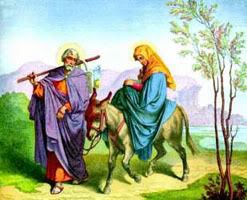
Labels: Advent
Friday, December 19, 2008
Friday In the Advent Embertide
Today is Ember Friday in Advent.
Here in Boston, our first snowstorm of the winter is closing in on us, predicted to start in the new few hours. We may get up to a foot of snow. But then, they always make dire predictions before a storm. Let's hope this is another case of Chicken Little yelling about the sky falling.
I am glad that i got my Holy Hour in early, before all the fun starts.
Here in Boston, our first snowstorm of the winter is closing in on us, predicted to start in the new few hours. We may get up to a foot of snow. But then, they always make dire predictions before a storm. Let's hope this is another case of Chicken Little yelling about the sky falling.
I am glad that i got my Holy Hour in early, before all the fun starts.
Labels: Remember It's Ember
Friday At the Foot Of the Cross
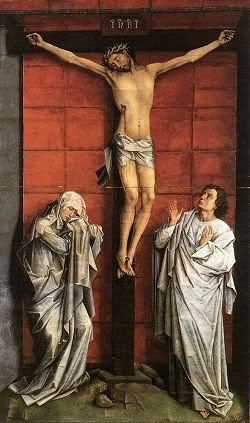
The Incarnation, Birth and Infancy of Jesus Christ, by St. Alphonsus de Liguori
Quæ utilitas in sanguine meo, dum descendo in corruptionem?
"What profit is there in My Blood, whilst I go down to corruption?"-----Ps. 29:10
Jesus Christ revealed to the Venerable Agatha of the Cross that whilst He was in his Mother's womb, that which afflicted Him more than any other sorrow was the hardness of the hearts of men, who should, after His Redemption, despise the graces which He came into the world to diffuse. And He had expressed this sentiment before, by the mouth of David, in the words just quoted, which are generally thus understood by the holy Fathers: What profit is there in My blood, whilst I go down to corruption? St. Isidore explains whilst I descend into corruption, "whilst I descend to take the nature of man, so corrupted by vices and sins;" as if He had said, "O my Father, I am indeed going to clothe Myself with human flesh, in order to shed My Blood for men; but what profit is there in My Blood?-----the greater part of the world will set no value on My Blood, and will go on offending Me, as if I had done nothing for the love of them."
This sorrow was the bitter chalice which Jesus begged the Eternal Father to remove from Him, saying: Let this chalice pass from Me. [Matt. 26:39] What chalice? The sight of the contempt with which His love was treated. This made Him exclaim again on the Cross: My God, My God, why hast Thou forsaken Me? Our Lord revealed to St. Catherine of Sienna, that this was the abandonment of which He complained-----the knowledge, namely, that His Father would have to suffer that His Passion and His love should be despised by so many men for whom He died.
And this same sorrow tormented the Infant Jesus in the womb of Mary, the foresight of such a prodigality of sorrows, of ignominy, of blood-shedding, and of so cruel and ignominious a death, and all to so little purpose. The holy Child saw, even there, what the Apostle says, that many [indeed the greater number] should trample under foot His Blood, and despise His grace, which this Blood would obtain for them: Treading under foot the Son of God, and offering an affront to the Spirit of grace. [Heb. 10:29] But if we have been of the number of these ungrateful men, let us not despair; Jesus, at His birth, came to offer peace to men of good will, as He made the Angels sing: And on earth peace to men of good will. [Luke 2:14] Let us, then, change our will, repent of our sins, and resolve to love this good God, and we shall find peace, that is, the Divine friendship.
Affections and Prayers
O my most amiable Jesus, how much have I too caused Thee to suffer during Thy lifetime! Thou hast shed Thy blood for me with so much sorrow and love, and what fruit hast Thou hitherto drawn from me but contempt, offenses, and insults? But, my Redeemer, I will no longer afflict Thee; I hope that in the future Thy Passion will produce fruit in me by Thy grace, which I feel is already assisting me. I will love Thee above every other good; and to please Thee, I am ready to give my life a thousand times. Eternal Father, I should not have the boldness to appear before Thee to implore either pardon or graces, but Thy Son has told me, that whatever grace I ask of Thee in His name Thou wilt grant it to me: If ye shall ask anything of the Father in My name, He will give it to ye. [John 16:23] I offer Thee, therefore, the merits of Jesus Christ, and in His name I ask of Thee first a general pardon of all my sins; I ask holy perseverance even unto death; I ask of Thee, above all, the gift of Thy holy love. that it may make me always live according to Thy Divine will. As to my own will, I am resolved to choose a thousand deaths sooner than offend Thee, and to love Thee with my whole heart, and to do everything that I possibly can to please Thee. But in order to do all this, I beg of Thee, and hope to receive from Thee, grace to execute what I purpose. My Mother Mary, if thou wilt pray for me, I am safe. Oh, pray for me, pray; and cease not to pray till thou seest that I am changed, and made what God wishes me to be.
Amen.
Labels: Friday At the Foot Of the Cross
O Radix Jesse
O Radix Jesse, qui stas in signum populorum,
super quem continebunt reges os suum,
quem Gentes deprecabuntur:
veni ad liberandum nos, jam noli tardare.
O Root of Jesse, standing as a sign among the peoples;
before you kings will shut their mouths,
to you the nations will make their prayer:
Come and deliver us, and delay no longer.
Isaiah had prophesied:
* "A shoot shall come out from the stock of Jesse, and a branch shall grow out of his roots." Isaiah 11:1
* "On that day the root of Jesse shall stand as a signal to the peoples; the nations shall inquire of him, and his dwelling shall be glorious." Isaiah 11:10
Jesse was the father of King David, and Micah had prophesied that the Messiah would be of the house and lineage of David and be born in David’s city, Bethlehem Micah 5:1. Also compare Isaiah 45:14, Isaiah 52:15 and Romans 15:12.

Labels: Advent
Thursday, December 18, 2008
O Adonai
O Adonai, et Dux domus Israel,
qui Moysi in igne flammae rubi apparuisti,
et ei in Sina legem dedisti:
veni ad redimendum nos in brachio extento.
O Adonai, and leader of the House of Israel,
who appeared to Moses in the fire of the burning bush
and gave him the law on Sinai:
Come and redeem us with an outstretched arm.
Isaiah had prophesied:
* "[...] but with righteousness he shall judge the poor, and decide with equity for the meek of the earth; he shall strike the earth with the rod of his mouth, and with the breath of his lips he shall kill the wicked. Righteousness shall be the belt around his waist, and faithfulness the belt around his loins." Isaiah 11:4-5
* "For the Lord is our judge, the Lord is our ruler, the Lord is our king; he will save us." Isaiah 33:22
Also compare Exodus 3:2 and Exodus 24:12
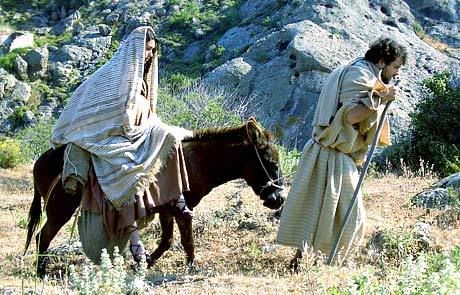
Labels: Advent
Wednesday, December 17, 2008
O Sapientia
The YouTube of all of the O Antiphons clips are recordings of Dominican seminarians, provided by Godzdogz.
O Sapientia, quae ex ore Altissimi prodiisti,
attingens a fine usque ad finem,
fortiter suaviterque disponens omnia:
veni ad docendum nos viam prudentiae.
O Wisdom, coming forth from the mouth of the Most High,
reaching from one end to the other mightily,
and sweetly ordering all things:
Come and teach us the way of prudence.
All commentary on the O Antiphons are from Wikipedia:
Isaiah had prophesied:
* "The spirit of the Lord shall rest on him, the spirit of wisdom and understanding, the spirit of counsel and might, the spirit of knowledge and the fear of the Lord. His delight shall be in the fear of the Lord." Isaiah 11:2-3
* "[...] he is wonderful in counsel, and excellent in wisdom." Isaiah 28:29
Also compare Sirach 24:3 and Wisdom of Solomon 8:1
This prophecy is also relevant in that it describes the Messiah as "coming forth from the mouth of the Most High", which is very significant in light of the Christian doctrine, rooted in the first chapter of the Gospel of John, according to which Jesus Christ, the Messiah, is the Incarnate Word of God the Father.
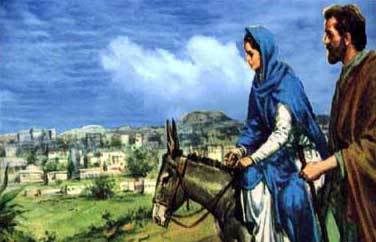
Labels: Advent
Wednesday In the Advent Embertide
This is a day of penance, and a day for extra prayers, almsgiving, as well as fasting and abstinence.
Folklore would tell you that the weather of the Wednesday in Advent's Embertide will foretell the weather for January.
Here is a lovely instrumental rendition of In the Bleak Midwinter, by Loreena McKennitt.
Folklore would tell you that the weather of the Wednesday in Advent's Embertide will foretell the weather for January.
Here is a lovely instrumental rendition of In the Bleak Midwinter, by Loreena McKennitt.
Labels: Advent
Tuesday, December 16, 2008
Sixty-Four Year Ago, The Battle Of the Bulge Began
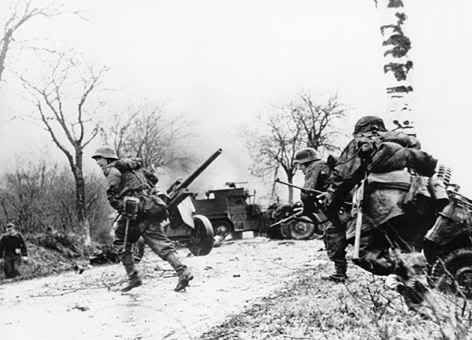
On December 16th, 1944, three German armies began an offensive along the Western Front, under cover of low clouds and fog. The Germans threw some 600 tanks into the attack, and aimed them at 3 American divisions (one veteran divison badly in need of rest and replacements after months of fighting, and 2 brand new, untried units) holding a quiet sector of the line in the Ardennes.
The German objective was ambitious, perhaps too ambitious given the resources available to them. The wooded Ardennes was to be crossed, pushing aside the American resistance, the River Meuse was to be crossed in the vicinity of Dinant, where the Germans had broken through in 1940, and the port of Antwerp was to be reached. If they got there, they would cut the Allied line in two, probably driving the Brits int he north into the sea. Taking Antwerp would also disrupt Allied logistical arrangements, as they were using the port to bring in supplies.
German secrecy had been impressive. Planning for the offensive began in September. Reserves of manpower, fuel, ammunition, and armored vehicles were carefully husbanded for it. All orders concerning the attack had been banned from radio traffic, and were delivered by hand of officer only.
The result was that the Allies were caught by surprise, since almost everyone thought the Wehrmacht was finished and that the war would soon be over. Eisenhower and Montgomery had a well-publicized 5 Pound bet on whether it would end by Christmas or not. Patton was due to begin an offensive south of the area the Germans attacked in a few days. Many senior officers were on leave, and the General Bradley had only the two American Airborne Divisions, the 82nd and 101st, in reserve, and both were refitting after having been committed too long to the fighting in Holland in September and October.
The Allies had been able to completely thwart all Geman efforts at an armored offensive, in large part because, with unchallenged air supremacy, Allied planes swooped down on attacking German formations with machine guns, bombs, and rockets, and took a heavy toll on German tanks, supply columns, and massed troops.
But the low clouds and fog meant (in 1944) that virtually no Allied planes were flying.
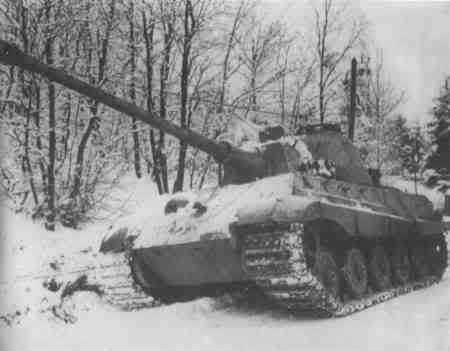
The Germans managed to penetrate the Allied line, though a stiff shoulder on the northern flank of the attack around Elsenborn Ridge and the villages of Krinklet and Rocherath held up progress. To the south, there was less in the way of natural lines of resistance, though a mixture of American units were holding a vital crossroads at Bastonge. Thus the German gains looked like a large "bulge" in the Allied line.
Bradley reacted slowly, but decisively. Patton was ordered to call off his offensive in the Saar, and get his units on the move north to drive into the German gains from the south. The 82nd Airborne was sent to help stiffen resistence around Elsenborn Ridge, and the 101st was committed to hold Bastonge. Montgomery ordered British units to backstop the Americans, holding a line on the far bank of the River Meuse.
The fighting around Bastonge, with the 101st going in virtually unarmed, and scrounging ammunition from the dead and wounded, and holding for more than a week (in fact, they moved very little in over a month of fighting), the pompous German demand for surrender, and the response from the acting diviisonal commander, Brig. McAuliffe, "Nuts!" is the stuff of which legends are made.
With Patton driving up from the south towards Bastonge, and every man who could carry a gun being scrapped out of billets behind the lines and made into combat infantry replacements, with the clearing of the skies for the Allied air forces shortly before Christmas, the tide turned against the Germans. The 2nd US Armored Division, with a lot of help from close air support from the Army Air Corps, stopped the German 2nd Panzer Division in the vicinity of Celles, a few miles from the Meuse.
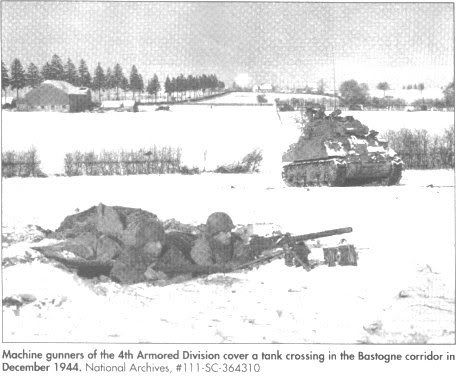
It took a month of very hard fighting, some of it in deep snow (though on December 16th, based on many photographs I have examined, the weather appears to have been raw with rain and fog, but no snow over most of the sector) before the Germans were made to slowly give back every square inch they gained in the first 5 days of the offensive.
What was the significance of the Battle of the Bulge?
It shortened the war considerably, since in using up his reserves in this attack, Hitler wasted an opportunity to use them to blunt the Russian winter offensive that carried them onto German soil, and eventually to Berlin itself. It turned the American soldiers, most of whom had had a relatively easy war since breaking out of Normandy, into first-rate soldiers, who met Hitler's best, and stopped them. And it showed, yet again, the importance of air power in modern warfare. The lack of air power allowed the Germans to make an impressive advance, and when that ability to utilize airpower was restored, the German gains were reversed.
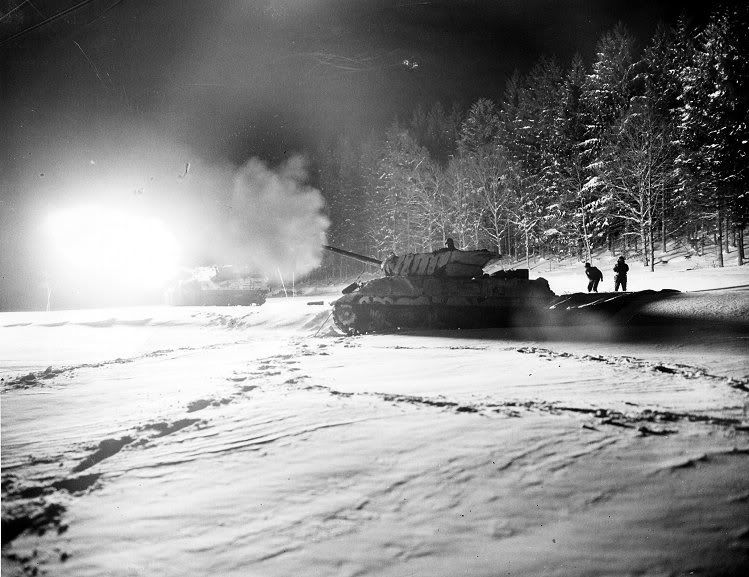
Labels: World War II
Winter From Vivaldi's Four Seasons
It is a few days early, according to the calendar, but we here in Boston may be getting our first measurable snow in the next day or so, and with Advent Embertide beginning tomorrow, with its emphasis on the four seasons, this seemed as good a time as any to play a little of Father Vivaldi's opus celebrating the four seasons.
Labels: Going For Baroque
Monday, December 15, 2008
Advent Meditation From Saint Alphonsus de Liguori
From The Incarnation, Birth and Infancy of Jesus, St. Alphonsus de Liguori
Haurietis aquas in gaudio de fontibus Salvatoris.
"You shall draw waters with joy out of the Savior's fountains."-----lsaiah 12:3
Consider the four fountains of grace that we have in Jesus Christ, as contemplated by St. Bernard.
The first is that of mercy, in which we can wash ourselves from all the filthiness of our sins. This fountain was formed for us by our Redeemer with His tears and His Blood: He loved us, and washed us from our sins in His Own Blood. [Apoc. 1:5]
The second fountain is that of peace and consolation in our tribulations: Call upon Me [saith Jesus Christ] in the day of trouble, and I will console thee. He that thirsteth, let him come to Me. He that thirsteth for true consolations even in this world, let him come to Me, for I will satisfy him. He that once tastes the water of My love will forever disdain all the delights of the world. But he that shall drink of the water that I will give him shall not thirst forever. And thoroughly contented will he be when he shall enter into the kingdom of the blessed, for the water of My grace shall raise him from earth to Heaven. It will become in him a fountain of water springing up into life everlasting. The peace which God gives to the souls that love Him is not the peace that the world promises from sensual pleasures, which leave in the soul more bitterness than peace; the peace which God bestows exceeds all the pleasures of the senses: Peace which surpasseth all understanding. [Phil. 4:7] Blessed are those who long for this Divine fountain. Blessed are they that hunger and thirst after justice. [Matt. 5:6]
The third fountain is that of devotion. Oh, how devout and ready to execute the Divine will, and increasing every day in virtue, is he who constantly meditates on all that Jesus Christ has done for our sake! He will be like the tree planted by a stream of water: He shall be like a tree that is planted near the running waters. [Ps. 1:3]
The fourth fountain is that of love: In my meditation a fire shall flame out. [Ps. 38; 4] It is impossible to meditate on the sufferings and ignominy borne by Jesus Christ for the love of us, and not to feel inflamed by that blessed fire which He came upon earth to enkindle. How true it is, then, that he who avails himself of these blessed fountains of Jesus Christ will always draw from them waters of joy and of salvation! You shall draw waters with joy out of the Savior's fountains.
Affections and Prayers
O my sweet and dearest Savior, how much do I not owe Thee! What an obligation hast Thou put upon me of loving Thee, since Thou hast done for me what no son would have done for his father, and no servant for his master! If Thou, therefore, hast loved me above everyone else, it is only just that I should love Thee above all others. I could wish to die with sorrow at the thought that Thou hast suffered so much for me, and that Thou didst accept for my sake the most painful and ignominious death that it is possible for a man to endure; and yet I have so often despised Thy friendship. How many times hast Thou forgiven me, and I have despised Thee afresh? But Thy merits are my hope. I now esteem Thy grace above all the kingdoms of the world. I love Thee, and for Thy love I accept every sorrow, every kind of death. And if I am not worthy to die for Thy glory by the hand of executioners, I accept at least willingly that death which Thou hast allotted to me; and I accept it in the manner and at the time that Thou shalt choose. My dear Mother Mary, obtain for me the grace always to live and to die loving Jesus.
Amen.
Haurietis aquas in gaudio de fontibus Salvatoris.
"You shall draw waters with joy out of the Savior's fountains."-----lsaiah 12:3
Consider the four fountains of grace that we have in Jesus Christ, as contemplated by St. Bernard.
The first is that of mercy, in which we can wash ourselves from all the filthiness of our sins. This fountain was formed for us by our Redeemer with His tears and His Blood: He loved us, and washed us from our sins in His Own Blood. [Apoc. 1:5]
The second fountain is that of peace and consolation in our tribulations: Call upon Me [saith Jesus Christ] in the day of trouble, and I will console thee. He that thirsteth, let him come to Me. He that thirsteth for true consolations even in this world, let him come to Me, for I will satisfy him. He that once tastes the water of My love will forever disdain all the delights of the world. But he that shall drink of the water that I will give him shall not thirst forever. And thoroughly contented will he be when he shall enter into the kingdom of the blessed, for the water of My grace shall raise him from earth to Heaven. It will become in him a fountain of water springing up into life everlasting. The peace which God gives to the souls that love Him is not the peace that the world promises from sensual pleasures, which leave in the soul more bitterness than peace; the peace which God bestows exceeds all the pleasures of the senses: Peace which surpasseth all understanding. [Phil. 4:7] Blessed are those who long for this Divine fountain. Blessed are they that hunger and thirst after justice. [Matt. 5:6]
The third fountain is that of devotion. Oh, how devout and ready to execute the Divine will, and increasing every day in virtue, is he who constantly meditates on all that Jesus Christ has done for our sake! He will be like the tree planted by a stream of water: He shall be like a tree that is planted near the running waters. [Ps. 1:3]
The fourth fountain is that of love: In my meditation a fire shall flame out. [Ps. 38; 4] It is impossible to meditate on the sufferings and ignominy borne by Jesus Christ for the love of us, and not to feel inflamed by that blessed fire which He came upon earth to enkindle. How true it is, then, that he who avails himself of these blessed fountains of Jesus Christ will always draw from them waters of joy and of salvation! You shall draw waters with joy out of the Savior's fountains.
Affections and Prayers
O my sweet and dearest Savior, how much do I not owe Thee! What an obligation hast Thou put upon me of loving Thee, since Thou hast done for me what no son would have done for his father, and no servant for his master! If Thou, therefore, hast loved me above everyone else, it is only just that I should love Thee above all others. I could wish to die with sorrow at the thought that Thou hast suffered so much for me, and that Thou didst accept for my sake the most painful and ignominious death that it is possible for a man to endure; and yet I have so often despised Thy friendship. How many times hast Thou forgiven me, and I have despised Thee afresh? But Thy merits are my hope. I now esteem Thy grace above all the kingdoms of the world. I love Thee, and for Thy love I accept every sorrow, every kind of death. And if I am not worthy to die for Thy glory by the hand of executioners, I accept at least willingly that death which Thou hast allotted to me; and I accept it in the manner and at the time that Thou shalt choose. My dear Mother Mary, obtain for me the grace always to live and to die loving Jesus.
Amen.
Labels: Advent
I've Been Astonishingly Good...
In holding back the Christmas posts this year. That isn't to say that I'm not fairly ready to burst. After the Advent Embertide, expect to be bombarded with Christmas. There are only ten days now until Christmas!
Labels: Advent
Sunday, December 14, 2008
Advent Embertide Alert
The Wednesday, Friday, and Saturday following Gaudete Sunday constitute the Advent Embertide. So this coming Wednesdaythe 17th, Friday the 19th, and Saturdaythe 20th are Ember Days.
Also note that the O Antiphons begin on Wednesday the 17th.
Also note that the O Antiphons begin on Wednesday the 17th.
Labels: Remember It's Ember
The Third Sunday Of Advent: Gaudete Sunday
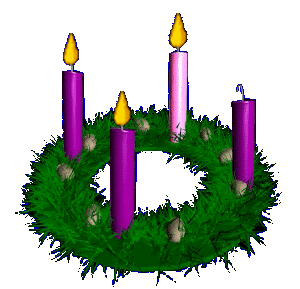
Station Church: Saint Peter At the Vatican
From The Liturgical Year, by Abbot Prosper Gueranger, OSB:
TODAY, again, the Church is full of joy, and the joy is greater than it was. It is true that her Lord has not come; but she feels that He is nearer than before, and therefore she thinks it just to lessen somewhat the austerity of this penitential season by the innocent cheerfulness of her sacred rites. And first, this Sunday has had the name of Gaudete given to it, from the first word of the Introit; it also is honored with those impressive exceptions which belong to the fourth Sunday of Lent, called Lætare. The organ is played at the Mass; the vestments are rose-color [optional]; the deacon resumes the dalmatic, and the subdeacon the tunic; and in cathedral churches the bishop assists with the precious miter. How touching are all these usages, and how admirable this condescension of the Church, wherewith she so beautifully blends together the unalterable strictness of the dogmas of faith and the graceful poetry of the formulæ of her liturgy! Let us enter into her spirit, and be glad on this third Sunday of her Advent, because our Lord is now so near unto us. Tomorrow we will resume our attitude of. servants mourning for the absence of their Lord and waiting for Him; for every delay, however short, is painful and makes love sad.
The Station is kept in the basilica of St. Peter, at the Vatican. This august temple, which contains the tomb of the prince of the Apostles, is the home and refuge of all the faithful of the world; it is but natural that it should be chosen to witness both the joy and the sadness of the Church.
The night Office commences with a new Invitatory. The voice of the Church no longer invites the faithful to come and adore in fear and trembling the King, our Lord, Who is to come. Her language assumes another character; her tone is one of gladness; and now, every day, until the vigil of Christmas, she begins her nocturnes with these grand words:
The Lord is now nigh; come, let us adore . . . O holy Roman Church, city of our strength! Behold us thy children assembled within thy walls, around the tomb of the fisherman, the prince of the Apostles, whose sacred relics protect thee from their earthly shrine, and whose unchanging teaching enlightens thee from Heaven. Yet, O city of strength: it is by the Savior, Who is coming, that thou art strong. He is thy wall, for it is He that encircles, with His tender mercy, all thy children; He is thy bulwark, for it is by Him that thou art invincible, and that all the powers of Hell are powerless to prevail against thee. Open wide thy gates, that all nations may enter thee; for thou art mistress of holiness and the guardian of truth. May the old error, which sets itself against the faith, soon disappear, and peace reign over the whole fold! O holy Roman Church! thou hast forever put thy trust in the Lord; and He, faithful to His promise, has humbled before thee the haughty ones that defied thee, and the proud cities that were against thee. Where now are the Cæsars, who boasted that they had drowned thee in thine own blood? Where the emperors, who would ravish the inviolate virginity of thy faith? Where the heretics, who, during the past centuries of thine existence, have assailed every article of thy teaching, and denied what they listed? Where the ungrateful princes, who would fain make a slave of thee, who hadst made them what they were? Where that empire of Mahomet, which has so many times raged against thee, for that thou, the defenseless State, didst arrest the pride of its conquests? Where the reformers, who were bent on giving the world a Christianity, in which thou wast to have no part? Where the more modern sophists, in whose philosophy thou wast set down as a system that had been tried, and was a failure, and is now a ruin; and those kings who are acting the tyrant over thee, and those people that win have liberty independently and at the risk of truth, where win they be in another hundred years? Gone and forgotten as the noisy anger of a torrent; whilst thou, O holy Church of Rome, built on the immovable rock, wilt be as calm, as young, as unwrinkled as ever. Thy path through all the ages of this world's duration, will be right as that of the just man; thou wilt ever be the same unchanging Church, as thou hast been during the eighteen hundred years past, whilst everything else under the sun has been but change. Whence this thy stability, but from Him Who is very truth and justice? Glory be to Him in thee! Each year, He visits thee; each year, He brings thee new gifts, where with thou mayst go happily through thy pilgrimage; and to the end of time, He will visit thee, and renew thee, not only with the power of that look wherewith Peter was renewed, but by filling thee with Himself, as He did the ever glorious Virgin, who is the object of thy most tender love, after that which thou bearest to Jesus Himself. We pray with thee, O Church, our mother, and here is our prayer: 'Come, Lord Jesus! Thy name and Thy remembrance are the desire of our souls: they have desired Thee in the night, yea, and early in the morning have they watched for Thee.'
Labels: Advent






































































































